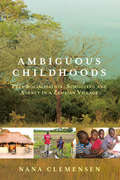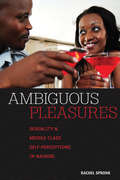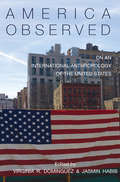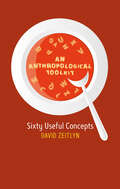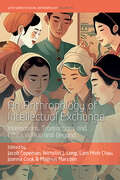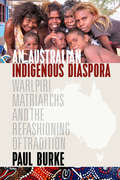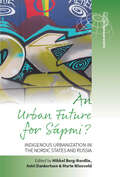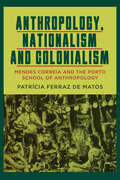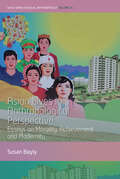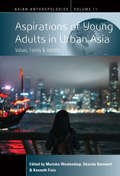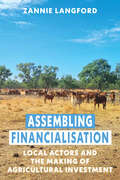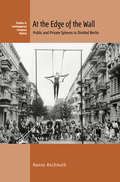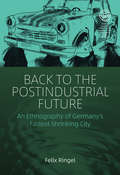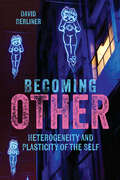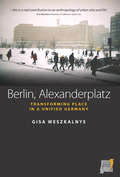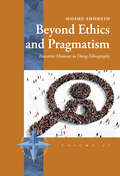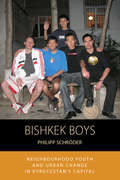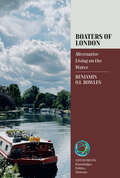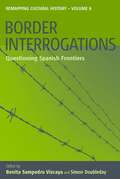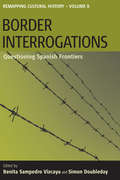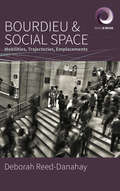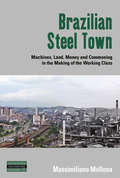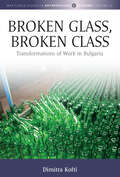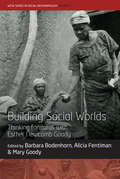- Table View
- List View
Ambiguous Childhoods: Peer Socialisation, Schooling and Agency in a Zambian Village
by Nana ClemensenGrowing up with social and economic upheaval in the peripheries of global neoliberalism, children in rural Zambia are presented with diverging social and moral protocols across homes, classrooms, church halls, and the street. Mostly unmonitored by adults, they explore the ambiguities of adult life in playful interactions with their siblings and kin across gender and age. Drawing on rich linguistic-ethnographic details of such interactions combined with observations of school and household procedures, the author provides a rare insight into the lives, voices, and learning paths of children in a rural African setting.
Ambiguous Pleasures
by Rachel SpronkAmong both male and female young urban professionals in Nairobi, sexuality is a key to achieving a 'modern' identity. These young men and women see themselves as the avant garde of a new Africa, while they also express the recurring worry of how to combine an 'African' identity with the new lifestyles with which they are experimenting. By focusing on public debates and their preoccupations with issues of African heritage, gerontocratic power relations and conventional morality on the one hand, and personal sexual relationships, intimacy and self-perceptions on the other, this study works out the complexities of sexuality and culture in the context of modernity in an African society. It moves beyond an investigation of a health or development perspective of sexuality and instead examines desire, pleasure and eroticism, revealing new insights into the methodology and theory of the study of sexuality within the social sciences. Sexuality serves as a prism for analysing how social developments generate new notions of self in postcolonial Kenya and is a crucial component towards understanding the way people recognize and deal with modern changes in their personal lives.
America Observed: On an International Anthropology of the United States
by Virginia R. Dominguez Jasmin HabibThere is surprisingly little fieldwork done on the United States by anthropologists from abroad. America Observed fills that gap by bringing into greater focus empirical as well as theoretical implications of this phenomenon. Edited by Virginia Dominguez and Jasmin Habib, the essays collected here offer a critique of such an absence, exploring its likely reasons while also illustrating the advantages of studying fieldwork-based anthropological projects conducted by colleagues from outside the U.S. This volume contains an introduction written by the editors and fieldwork-based essays written by Helena Wulff, Jasmin Habib, Limor Darash, Ulf Hannerz, and Moshe Shokeid, and reflections on the broad issue written by Geoffrey White, Keiko Ikeda, and Jane Desmond. Suitable for introductory and mid-level anthropology courses, America Observed will also be useful for American Studies courses both in the U.S. and elsewhere.
An Anthropological Toolkit: Sixty Useful Concepts
by David ZeitlynPresenting sixty theoretical ideas, David Zeitlyn asks ‘How to write about anthropological theory without making a specific theoretical argument.’ “David Zeitlyn has written a wryly engaging, short book on, essentially, why we should not become theoretical partisans—that, indeed, being a serious theorist means accepting precisely that principle.”—Michael Herzfeld, Harvard University To answer, he offers a series of mini essays about an eclectic collection of theoretical concepts that he has found helpful over the years. The book celebrates the muddled inconsistencies in the ways that humans live their messy lives. There are, however, still patterns discernible: the actors can understand what is going on, they see an event unfolding in ways that are familiar, as belonging to a certain type and therefore, Zeitlyn suggests, so can researchers. From the introduction: This book promotes an eclectic, multi-faceted anthropology in which multiple approaches are applied in pursuit of the limited insights which each can afford…. I do not endorse any one of these idea as supplying an exclusive path to enlightenment: I absolutely do not advocate any single position. As a devout nonconformist, I hope that the following sections provide material, ammunition and succour to those undertaking nuanced anthropological analysis (and their kin in related disciplines)…. Mixing up or combining different ideas and approaches can produce results that, in their breadth and richness, are productive for anthropology and other social sciences, reflecting the endless complexities of real life. …This is my response to the death of grand theory. I see our task as learning how to deal with that bereavement and how to resist the siren lures of those promising synoptic overviews. This book is relevant to anthropology, communication studies, cultural studies and sociology.
An Anthropology of Intellectual Exchange: Interactions, Transactions and Ethics in Asia and Beyond (WYSE Series in Social Anthropology #15)
by Magnus Marsden Jacob Copeman, Nicholas J. Long, Lam Minh Chau, Joanna CookDialogues, encounters and interactions through which particular ways of knowing, understanding and thinking about the world are forged lie at the centre of anthropology. Such ‘intellectual exchange’ is also central to anthropologists’ own professional practice: from their interactions with research participants and modes of pedagogy to their engagements with each other and scholars from adjacent disciplines. This collection of essays explores how such processes might best be studied cross-culturally. Foregrounding the diverse interactions, ethical reasoning, and intellectual lives of people from across the continent of Asia, the volume develops an anthropology of intellectual exchange itself.
An Australian Indigenous Diaspora: Warlpiri Matriarchs and the Refashioning of Tradition
by Paul Burke<p>Some indigenous people, while remaining attached to their traditional homelands, leave them to make a new life for themselves in white towns and cities, thus constituting an “indigenous diaspora”. <p>This innovative book is the first ethnographic account of one such indigenous diaspora, the Warlpiri, whose traditional hunter-gatherer life has been transformed through their dispossession and involvement with ranchers, missionaries, and successive government projects of recognition. <p>By following several Warlpiri matriarchs into their new locations, far from their home settlements, this book explores how they sustained their independent lives, and examines their changing relationship with the traditional culture they represent.</p>
An Urban Future for Sápmi?: Indigenous Urbanization in the Nordic States and Russia (Studies in the Circumpolar North #4)
by Marte Winsvold Mikkel Berg-Nordlie, Astri DankertsenPresenting the political and cultural processes that occur within the indigenous Sámi people of North Europe as they undergo urbanization, this book examines how they have retained their sense of history and culture in this new setting. The book presents data and analysis on subjects such as indigenous urbanization history, urban indigenous identity issues, urban indigenous youth, and the governance of urban “spaces” for indigenous culture and community. The book is written by a team of researchers, mostly Sámi, from all the countries covered in the book.
Anthropology, Nationalism and Colonialism: Mendes Correia and the Porto School of Anthropology
by Patrícia Ferraz de MatosA major contribution to the history of European anthropology, this book highlights the Porto School of Anthropology and analyses the work of its main mentor, Mendes Correia (1888-1960). It goes beyond a Portuguese focus to present a wider comparative analysis in which the colonial empire, knowledge of origins, ethnic identity and cultural practices all receive special attention. The analysis takes into account the fact that nationalism, as associated with an ethno-racial paradigm, decisively influenced discourse and scientific and political practices.
Asian Lives in Anthropological Perspective: Essays on Morality, Achievement and Modernity (WYSE Series in Social Anthropology #16)
by Susan BaylyContemporary Asian societies bear the imprint of the experience and afterlives of colonialism, revolutionary socialism and religious and secular nationalism in dramatically contrasting ways. Asian Lives in Anthropological Perspective draws together essays that demonstrate the role of these far-reaching transformations in the shaping of two Asian settings in particular – India and Vietnam. It traces historical and contemporary realities through a variety of compelling topics including the lived experience of India’s caste system and the ethical challenges faced by Vietnamese working women.
Aspirations of Young Adults in Urban Asia: Values, Family, and Identity (Asian Anthropologies #11)
by Mariske Westendorp Désirée Remmert and Kenneth FinisComparing first-person ethnographic accounts of young people living, working, and creating relationships in cities across Asia, this volume explores their contemporary lives, pressures, ideals, and aspirations. Delving into topical issues such as education, social inequality, family pressures, changing values, precarious employment, and political discontent, the book explores how young people are pushing boundaries and imagining their future. In this way, they explore and create the identities of their local and global surroundings.
Aspirations of Young Adults in Urban Asia: Values, Family, and Identity (Asian Anthropologies #11)
by Mariske Westendorp, Désirée Remmert and Kenneth FinisComparing first-person ethnographic accounts of young people living, working, and creating relationships in cities across Asia, this volume explores their contemporary lives, pressures, ideals, and aspirations. Delving into topical issues such as education, social inequality, family pressures, changing values, precarious employment, and political discontent, the book explores how young people are pushing boundaries and imagining their future. In this way, they explore and create the identities of their local and global surroundings.
Assembling Financialisation: Local Actors and the Making of Agricultural Investment
by Zannie LangfordFarmers, Indigenous organisations, government and private-sector intermediaries from remote Northern Australia often negotiate with private finance capital to gain funds for agricultural development.The concept of financialisation is used to explore the drivers and effects of agrifood restructuring in the area, while assemblage theory is applied to position local actors as potential sites of power in negotiating connections between local spaces and global finance. This book demonstrates that while financialisation is a useful signifier of patterns of global change, it is assembled by a diverse range of often contradictory work.
At the Edge of the Wall: Public and Private Spheres in Divided Berlin (Contemporary European History #26)
by Hanno HochmuthLocated in the geographical center of Berlin, the neighboring boroughs of Friedrichshain and Kreuzberg shared a history and identity until their fortunes diverged dramatically following the construction of the Berlin Wall, which placed them within opposing political systems. This revealing account of the two municipal districts before, during and after the Cold War takes a microhistorical approach to investigate the broader historical trajectories of East and West Berlin, with particular attention to housing, religion, and leisure. Merged in 2001, they now comprise a single neighborhood that bears the traces of these complex histories and serves as an illuminating case study of urban renewal, gentrification, and other social processes that continue to reshape Berlin.
Back to the Postindustrial Future: An Ethnography of Germany's Fastest-Shrinking City (EASA Series #33)
by Felix RingelHow does an urban community come to terms with the loss of its future? The former socialist model city of Hoyerswerda is an extreme case of a declining postindustrial city. Built to serve the GDR coal industry, it lost over half its population to outmigration after German reunification and the coal industry crisis, leading to the large-scale deconstruction of its cityscape. This book tells the story of its inhabitants, now forced to reconsider their futures. Building on recent theoretical work, it advances a new anthropological approach to time, allowing us to investigate the postindustrial era and the futures it has supposedly lost.
Becoming Other: Heterogeneity and Plasticity of the Self
by David BerlinerMost of us are conscious of having a single and stable self, but the self is more fragmented and plastic than we care to think. David Berliner explores the captivating world of identity through an array of astonishing experiences. From Napoleon doppelgangers to Philip Roth's alter-ego Nathan Zukerman and Wonder Woman cosplayers to anthropologists going native, he delves into the kaleidoscopic nature of the self and attempts to understand the heterogenous nature of identity. But Becoming Other also discusses a great cultural controversy of our time: who has the right to play at being whom?
Berlin, Alexanderplatz: Transforming Place in a Unified Germany (Space and Place #1)
by Gisa WeszkalnysA benchmark study in the changing field of urban anthropology, Berlin, Alexanderplatz is an ethnographic examination of the rapid transformation of the unified Berlin. Through a captivating account of the controversy around this symbolic public square in East Berlin, the book raises acute questions about expertise, citizenship, government and belonging. Based on ethnographic fieldwork in the city administration bureaus, developers' offices, citizen groups and in Alexanderplatz itself, the author advances a richly innovative analysis of the multiplicity of place. She reveals how Alexanderplatz is assembled through the encounters between planners, citizen activists, social workers, artists and ordinary Berliners, in processes of popular participation and personal narratives, in plans, timetables, documents and files, and in the distribution of pipes, tram tracks and street lights. Alexanderplatz emerges as a socialist spatial exemplar, a 'future' under construction, an object of grievance, and a vision of robust public space. This book is both a critical contribution to the anthropology of contemporary modernity and a radical intervention in current cross-disciplinary debates on the city.
Beyond Ethics and Pragmatism: Evocative Moments in Doing Ethnography (New Directions in Anthropology #47)
by Moshe ShokeidBased on several long-term fieldwork projects in Israel and the Unted States, this book brings together a repertoire of subjective and professional experiences of an anthropologist who attended various theoretical and methodological tutoring settings. That varied panorama of research milieus, ethnographic field sites, and diverse personal engagements, has offered a wide perspective on the complex craft of anthropology. Moreover, it sometimes placed the author in unexpected situations that challenged some habitually accepted modes of personal conduct as well as ethnographic research norms and paradigms, expanding the arena and terms of the anthropological assignments and the record of ethnographic works.
Bishkek Boys: Neighbourhood Youth and Urban Change in Kyrgyzstan’s Capital (Integration and Conflict Studies #17)
by Philipp SchröderIn this pioneering ethnographic study of identity and integration, author Philipp Schröder explores urban change in Kyrgyzstan’s capital Bishkek from the vantage point of the male youth living in one neighbourhood. Touching on topics including authority, violence, social and imaginary geographies, interethnic relations, friendship, and competing notions of belonging to the city, Bishkek Boys offers unique insights into how post-Socialist economic liberalization, rural-urban migration and ethnic nationalism have reshaped social relations among young males who come of age in this Central Asian urban environment.
Boaters of London: Alternative Living on the Water (Lifeworlds: Knowledges, Politics, Histories #5)
by Ben BowlesLondon and the Southeast of England is home to an alternative community of people called 'boaters': individuals and families who live on narrowboats, cruisers and barges, along a network of canals and rivers. Many of these people move from place to place every two weeks due to mooring rules and form itinerant communities in the heart of some of the UK’s most built-up and expensive urban spaces. Boaters of London is an ethnography that delves into the process of becoming a boater, adopting an alternative lifestyle on the water and the political impact that this travelling population has on the state.
Border Interrogations
by Benita Samperdro VizcayaUnder the current cartographies of globalism, where frontiers mutate, vacillate, and mark the contiguity of discourse, questioning the Spanish border seems a particularly urgent task. The volume engages a wide spectrum of ambivalent regions--subjects that currently are, or have been seen in the past, as spaces of negotiation and contestation. However, they converge in their perception of the "Spanish" nation-space as a historical and ideological construct that is perpetually going through transformations and reformations. This volume advocates the position that intellectual responsibility must lead us to engage openly in the issues underlying current social and political tensions.
Border Interrogations: Questioning Spanish Frontiers (Remapping Cultural History #8)
by Benita Samperdro Vizcaya Simon DoubledayUnder the current cartographies of globalism, where frontiers mutate, vacillate, and mark the contiguity of discourse, questioning the Spanish border seems a particularly urgent task. The volume engages a wide spectrum of ambivalent regions--subjects that currently are, or have been seen in the past, as spaces of negotiation and contestation. However, they converge in their perception of the "Spanish" nation-space as a historical and ideological construct that is perpetually going through transformations and reformations. This volume advocates the position that intellectual responsibility must lead us to engage openly in the issues underlying current social and political tensions.
Bourdieu and Social Space: Mobilities, Trajectories, Emplacements (Worlds in Motion #6)
by Deborah Reed-DanahayFrench sociologist and anthropologist Pierre Bourdieu’s relevance for studies of spatiality and mobility has received less attention than other aspects of his work. Here, Deborah Reed-Danahay argues that the concept of social space, central to Bourdieu’s ideas, addresses the structured inequalities that prevail in spatial choices and practices. She provides an ethnographically informed interpretation of social space that demonstrates its potential for new directions in studies of mobility, immobility, and emplacement. This book traces the links between habitus and social space across the span of Bourdieu’s writings, and places his work in dialogue with historical and contemporary approaches to mobility.
Brazilian Steel Town: Machines, Land, Money and Commoning in the Making of the Working Class (Dislocations #27)
by Massimiliano MollonaVolta Redonda is a Brazilian steel town founded in the 1940s by dictator Getúlio Vargas on an ex-coffee valley as a powerful symbol of Brazilian modernization. The city’s economy, and consequently its citizen’s lives, revolves around the Companha Siderurgica Nacional (CSN), the biggest industrial complex in Latin America. Although the glory days of the CSN have long passed, the company still controls life in Volta Redonda today, creating as much dispossession as wealth for the community. Brazilian Steel-Town tells the story of the people tied to this ailing giant – of their fears, hopes, and everyday struggles.
Broken Glass, Broken Class: Transformations of Work in Bulgaria (Max Planck Studies in Anthropology and Economy #12)
by Dimitra KoftiBased on a long-term study of the everyday postsocialist politics of labour in the wider context of intense socio-economic transformation in Bulgaria, this book tells the story of the flexibilization of production, the precaritization of work, shifting managerial practices, and ways in which people with different employment statuses live and work together. The ethnography starts with the rapidly moving conveyor belt of a glass factory, where a variety of global and local forces and workers’ divisions meet, and analyses how inequalities are reproduced both at the production site and back home.
Building Social Worlds: Thinking forwards with Esther Newcomb Goody (WYSE Series in Social Anthropology)
by Mary Goody Barbara Bodenhorn, Alicia FentimanEsther Newcomb Goody had an extensive academic career. She particularly revisited intellectual themes of kinship and relationships. This collection draws on ethnography across Africa, Europe, Oceania and the Americas, and uses Goody’s ideas to expand their understanding of the nature of relationships, communication, intimacy, resistance and resilience with a particular focus on rich ethnographies of childhood and learning. It discusses a wide range of subjects in personhood and parenthood, fosterage, apprenticeship and modes of learning; kinship in historical perspective; power, politics and speech; the effects of late-modern capitalism on households and the complex relations between persons and things.
